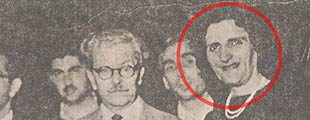Life After the Revolution
The Iranian Revolution of 1978 marked a turning point in Vida’s life. After her release from prison, she initially continued her activism within the Iranian People’s Revolutionary Guards Organization. However, ideological differences led her to part ways with the group in 1979. She then co-founded a new group called “Left Wing” in collaboration with Nasser Mohajer, seeking to create a more progressive and inclusive platform for Marxist activism.
As political repression intensified in Iran following the revolution, Vida chose exile, settling in Paris. In the diaspora, she continued her activism through intellectual and literary pursuits. She co-founded the magazine Aghazi No (“A New Beginning”), which she published for a decade with the help of like-minded friends. The magazine served as a platform for discussing leftist ideologies, women’s rights, and the struggles of political prisoners.
Literary Contributions
Vida Hajji Tabrizi’s most enduring legacy lies in her literary contributions, which documented the experiences of women in the revolutionary struggle. Her most significant work, Dad Bidad, is a collection of memoirs from 37 female political prisoners who endured the brutalities of SAVAK prisons. The book received widespread acclaim and was honored with the Sedighe Dolatabadi Prize for its groundbreaking portrayal of women’s resistance.
In 2010, she published Memories, a reflective account of her political journey and the broader struggle for justice. Through these writings, Vida provided a voice to those silenced by oppression, preserving their stories for future generations. Her works remain a testament to the resilience and courage of women in the face of unimaginable adversity.

